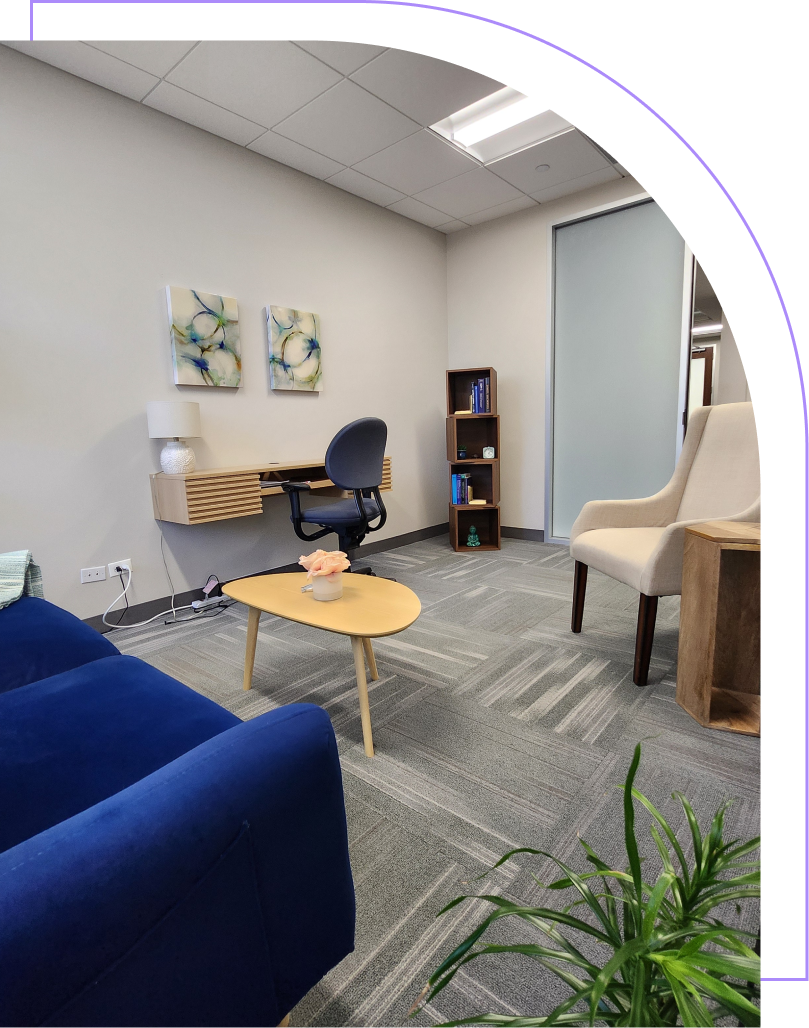
Are negative thoughts, anxiety, or unhelpful habits holding you back from living the life you want?
You’re not alone — and neither are you in wanting to make meaningful changes in your life.
Many people find themselves stuck in patterns of negative thinking, avoidance, or unhelpful coping strategies that can interfere with work, school, relationships, and overall mental health. These challenges are common, and seeking support doesn’t mean something is “wrong” with you — it means you’re committed to understanding your patterns and learning new ways to navigate life.
Cognitive Behavioral Therapy (CBT) is a structured, evidence-based approach that helps individuals understand the connection between thoughts, feelings, and behaviors. By noticing how certain thoughts trigger emotions and actions, clients can begin to identify patterns that no longer serve them. This awareness is the first step toward creating meaningful, lasting change.
Sometimes it can feel like your mind is constantly running, replaying worries, or spiraling into self-doubt. Behaviors and emotions may feel automatic or overwhelming, leaving you trapped in cycles that are difficult to break. CBT helps you take a step back, examine these patterns, and develop practical strategies for responding differently.
At Aram Connection Counseling, we provide a safe and supportive environment where clients can explore their thoughts and feelings without judgment. CBT is goal-oriented and focused on building skills that empower you to challenge distorted beliefs, adopt healthier thinking patterns, and make choices aligned with your values. Therapy isn’t about “fixing” you — it’s about giving you the tools to take control of your mind, build resilience, and live more intentionally every day.
Many people turn to CBT for help with challenges such as:
Recognizing these patterns is the first step toward breaking them and improving overall mental health.
How Aram Connection Supports CBT Clients
Our therapists guide clients through a structured, goal-oriented process to develop practical coping skills. CBT therapy can help you:
- Identify and challenge negative or distorted thoughts
- Develop healthier thought patterns and behaviors
- Build coping strategies for stress, anxiety, and depression
- Improve problem-solving and decision-making skills
- Track progress and celebrate growth along the way
CBT therapy equips clients with practical tools and strategies to manage thoughts, emotions, and behaviors more effectively.
Can we help?
What to Expect in CBT Therapy
Our approach is collaborative, structured, and tailored to each client’s unique needs. In sessions, therapists use evidence-based techniques to help clients:
Identify unhelpful thought patterns and behaviors
Challenge cognitive distortions and reframe thinking
Practice new coping strategies in real-life situations
Set measurable goals for personal growth and change
Track progress and adjust strategies as needed
Each session empowers clients to take actionable steps toward lasting change and improved emotional well-being.
Real-Life Examples
Imagine someone struggling with social anxiety that makes it difficult to speak up at work or in group settings. This anxiety may cause racing thoughts, self-doubt, or avoidance behaviors that interfere with career growth and personal confidence. Through Cognitive Behavioral Therapy (CBT), clients learn to recognize these anxious thoughts, evaluate their accuracy, and gradually practice new behaviors in safe, manageable steps. Over time, these small exercises build confidence, improve communication skills, and reduce the hold anxiety has on daily life.
Similarly, someone dealing with negative self-talk, low motivation, or feelings of inadequacy may find that inner critical messages affect mood, relationships, and performance. CBT helps clients identify these unhelpful thought patterns, challenge distorted beliefs, and replace them with balanced, realistic perspectives. This process allows individuals to break cycles of self-criticism, develop healthier habits, and make choices that align with their values and goals.
CBT is not only about coping with challenges — it’s about actively reshaping the patterns that keep clients stuck. By combining awareness, practical tools, and gradual behavioral changes, CBT empowers clients to respond to situations with resilience, intention, and clarity. Clients gain skills that extend beyond therapy sessions, fostering long-term personal growth, emotional regulation, and improved relationships.
Ultimately, CBT helps people move from simply managing symptoms to creating meaningful, lasting change in their lives. It’s about giving clients the tools to understand themselves, act intentionally, and feel more in control of their thoughts, behaviors, and emotional well-being.
A Safe Space for Clients
We provide a calm, judgment-free environment — in-person or online — where you can explore thoughts and behaviors safely. Sessions are structured yet flexible, allowing you to practice new skills in a supportive setting.
CBT therapy offers a safe, structured space to understand and reshape thought patterns for improved mental health.
Taking the First Step Toward Change
You don’t have to wait until things feel “bad enough” to ask for help. Often, the most compassionate and empowering step you can take is reaching out early—before frustration, anxiety, or miscommunication begin to take over. By seeking support sooner rather than later, you give yourself the opportunity to gain clarity, build coping strategies, and prevent unhelpful patterns from becoming entrenched. Reaching out is not a sign of weakness; it’s an investment in your well-being, your relationships, and your personal growth.
Whether you are facing stress, emotional overwhelm, relational challenges, or navigating life transitions, therapy provides a safe, supportive space to explore your experiences and identify practical ways to move forward. You don’t have to face difficult thoughts, emotions, or decisions alone. With guidance from trained therapists, you’ll learn strategies to understand your feelings, respond intentionally to challenges, and develop plans that align with your personal values.
Whether your needs involve short-term support for a specific challenge or ongoing guidance for deeper growth, we’re here to help you feel more grounded, connected, and empowered. Therapy is about exploring your experiences, strengthening resilience, and taking actionable steps to improve your emotional and relational well-being.
Reaching out today is the first step toward clarity, confidence, and lasting growth. Let’s talk about what’s been happening and how we can help you start feeling more like yourself again. Support is available now, and taking that first step can make a meaningful difference in your life.


Supporting Your Growth with CBT
Therapists collaborate with clients to:
Our goal?
To help clients understand their thoughts, manage emotions effectively, and develop actionable strategies — creating lasting change, resilience, and greater overall well-being.
Ready to take the next step?
Sometimes the hardest part is getting started—but once you do, things begin to feel lighter.
